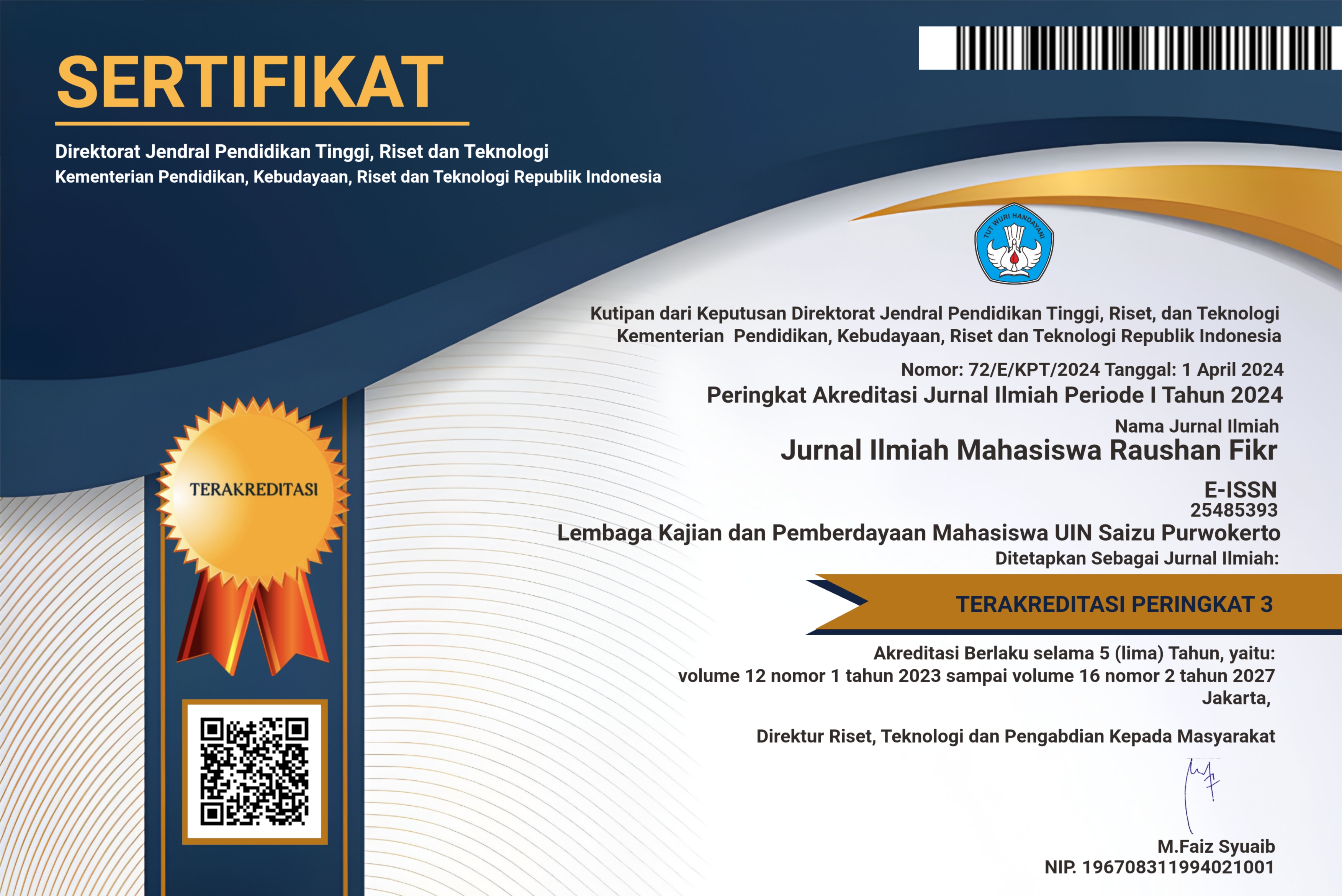Hermeneutika Sufistik-Filosofis: Penafsiran Ibn 'Arabi atas Kisah Nabi Musa dan Nabi Khidir dalam QS.Al-Kahfi 60-82.
DOI:
https://doi.org/10.24090/jimrf.v10i1.4637Keywords:
Hermenutika, Sufistik, Filosofis Ibn 'Arabi, Kisah Nabi Musa dan Nabi KhidirAbstract
This article examines the story of the Prophet Musa and the Prophet Khidir which are contained in Qs. Al-Kahfi 60-82. It is commonly known that the story tells of the mystical and suprarational events experienced by Prophet Musa while studying from Prophet Khidir. However, in this article, the study of the story of the Prophet Musa and Khidir becomes more interesting because - by using a descriptive-analytical approach - the writer tries to uncover the story through Ibn 'Arabi's perspective as stated in his commentary; Tafsi>r Ibn 'Arabi. As we know that the interpretation of Ibn 'Arabi by Husain al-Zahabi is categorized as a Sufi nadzari interpretation, which is an interpretation that is built to strengthen and promote philosophical and mystical theories adhered to by the commentators. As a result, Ibn 'Arabi's interpretation of the story is very different from the existing mainstream interpretation. In that sense, Ibn 'Arabi brought his interpretation of the story into the Sufistic-philosophical discourse. Because, in this story Ibn 'Arabi does not interpret it as a human journey physically (wadak) but is interpreted symbolically-allegorically, namely a spiritual journey, in which case the Prophet Musa is interpreted as a heart that wants to reach maqa> m kamal or makrifat to Allah through the guidance of the Prophet Khidir which is interpreted as a holy reason (al-'aql al-qudsi>).Downloads
References
Al-Hatimi, Muhyiddin Muhammad bin ‘Ali bin Muhammad bin Ahmad al-Tha’i. 2006. Tafsi>r Ibn ‘Arabi. Beirut: Dar al-Kutub al-‘Ilmiyyah.
Al-Jurjani, Ali bin Muhammad al-Sayyid al-Syarif. n.d. Mu’jam al-Ta’ri>fa>t. Kairo: Dar al-Fadilah.
Al-Qasyani, Abd al-Razzaq. 1992. Mu’jam Is}tila>h{a>t al-S{ufiyyah. Kairo: Dar al-Manar.
Al-Razi, Muhammad. 1981. Mafa>tih} Al-Ghaib. Vol. 21. Beirut: Dar al-Fikr.
Al-Tahanawi, Muhammad ‘Ali. 1996. Kasya>fu Is}t}ila>h{ati Al-Funu>n Wa al-‘Ulu>m. Vol. 2. Beirut: Maktabah Lubnan.
Al-Zahabi, Muhammad Husain. 2000. Al-Tafsi>r Wa al-Mufassiru>n. Kairo: Maktabah Wahbah.
Asyur, Muhammad Ibnu. n.d. Tafsi>r Al-Tah}ri>r Wa al-Tanwi. Vol. 15.
Blackburn, Simon. 2013. Kamus Filsafat. Yogyakarta: Pustaka Pelajar.
Dimyati, Muhammad Afif. 2016. Ilmu Al-Tafsi>r Us}u>lu Wa Mana<hijuhu. Sidoarjo: Maktabah Lisan ’Arabi.
Hafni, Abdul Mun’im al-. 2000. Al-Mu’jam al-Sya>mil Li Must}ala>ha>t al-Falsafah. Kairo: Maktabah Madbu>li.
al-Taba’taba'i, Husain’. 1997. Al-Mi>zan Fi Tafsi>r al-Qur’an. Vol. 13. Beirut: Muassasah al-A<’lami> li al-Mat}bu>’at.
Kurdi, dkk. 2010. Hermeneutika Al-Qur’an Dan Hadis. Yogyakarta: el-Saq.
Mustaqim, Abdul. 2008. Pergeseran Epistemologi Tafsir. Yogyakarta: Pustaka Pelajar.
Noer, Kautsar Azhari. 1995. Ibn Al’-‘Arabi Wahdat al-Wujud Dalam Perdebatan. Jakarta: Paramadina.
Riyanto, Waryani Fajar. 2014. “Antisinonimitas Tafsir Sufi Kontemporer.†Epistemé: Jurnal Pengembangan Ilmu Keislaman 9 (1): 139–54. https://doi.org/10.21274/epis.2014.9.1.139-154.
Saliba, Jamil. 1982. Al-Mu’jam al-Falsafi>. Beirut: Dar al-Kutub.
Soehadha, Moh. 2012. Metode Penelitian Sosial Kualitatif Untuk Studi Agama. Yogyakarta: SUKA-Press.
Syarif, M.M. 1992. Para Filosof Muslim. Bandung: Mizan.
Syarifuddin, Oleh M Anwar. 2004. “Menimbang Otoritas Sufi dalam Menafsirkan Al-Qur’Än.†Studi Agama dan Masyarakat 1 (2): 13.
Wahbah, Murad. 2007. Al-Mu’jam al-Falsafi>. Kairo: Dar Quba’ al-Hadisah.
Zar, Sirajudin. 2004. Filsafat Islam Filosof Dan Filsafatnya. Jakarta: PT. Raja Grafindo Persada.
Downloads
Published
How to Cite
Issue
Section
License
Authors who publish with this journal agree to the following terms:
- Authors retain copyright and grant the journal right of first publication with the work simultaneously licensed under a Creative Commons Attribution-NonCommercial-ShareAlike 4.0 International License that allows others to share the work with an acknowledgement of the work's authorship and initial publication in this journal.
- Authors are able to enter into separate, additional contractual arrangements for the non-exclusive distribution of the journal's published version of the work (e.g., post it to an institutional repository or publish it in a book), with an acknowledgement of its initial publication in this journal.
- Authors are permitted and encouraged to post their work online (e.g., in institutional repositories or on their website) prior to and during the submission process, as it can lead to productive exchanges, as well as earlier and greater citation of published work (See The Effect of Open Access).
















